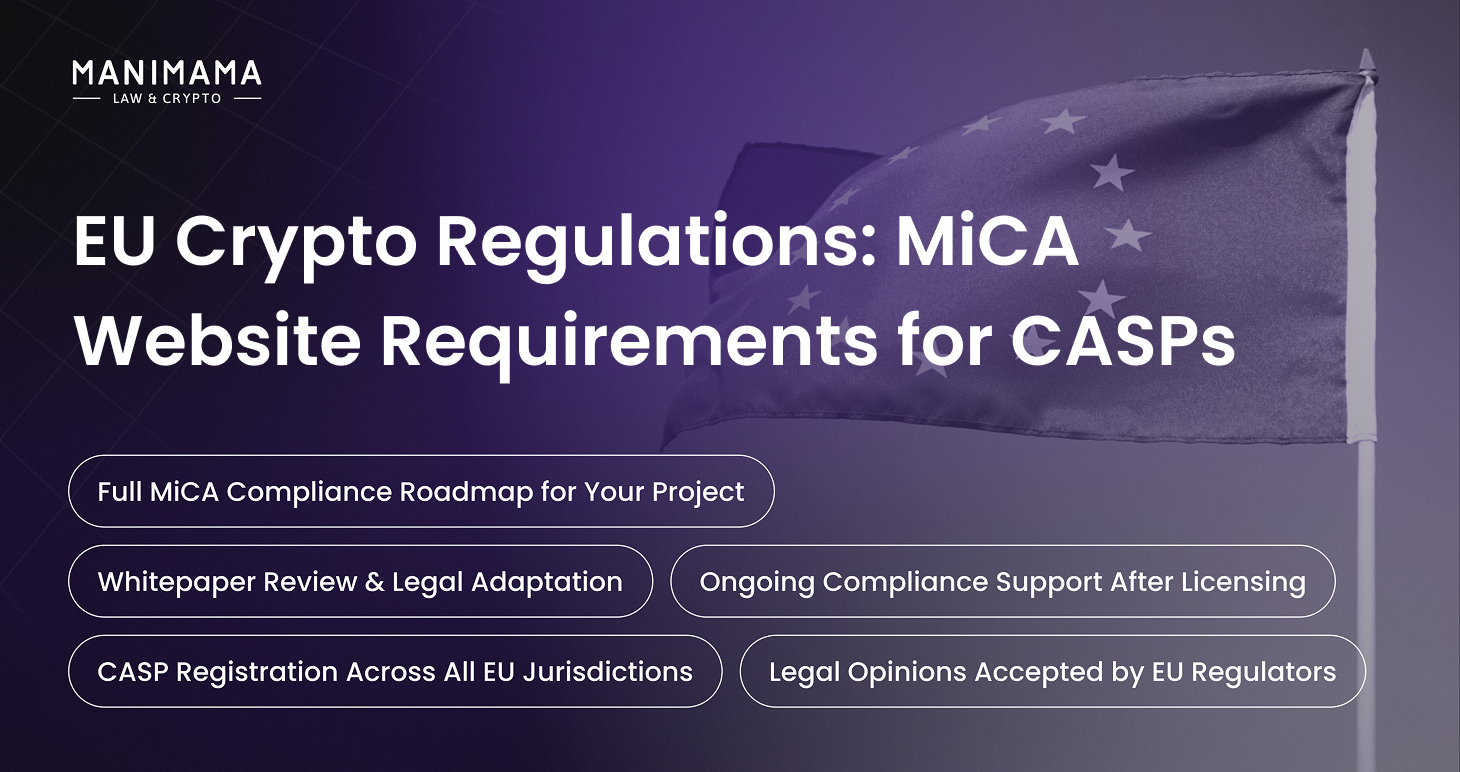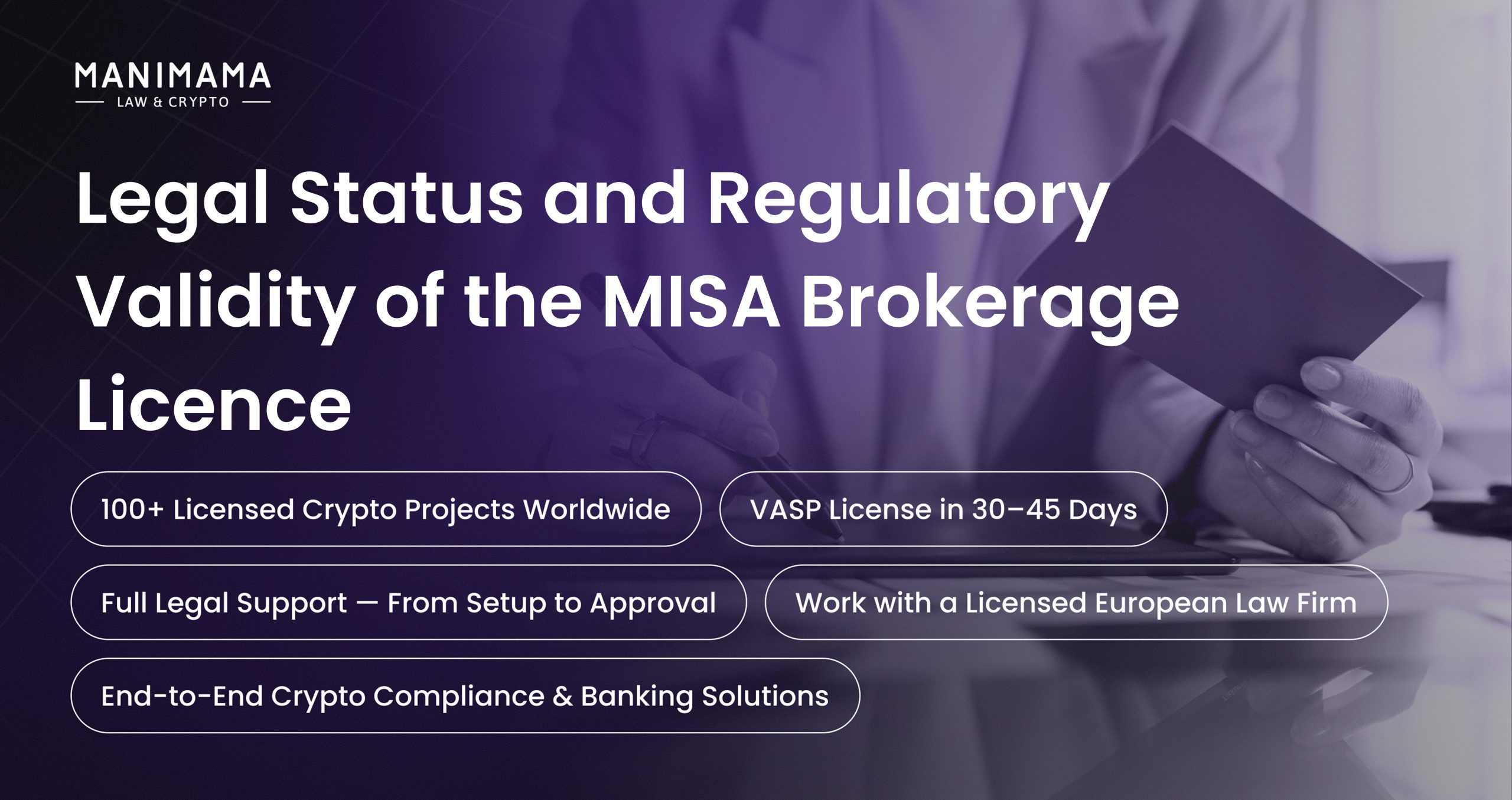With the rollout of MiCA (Markets in Crypto-Assets Regulation), the EU is setting a global standard for regulating crypto asset markets. For crypto-asset service providers (CASPs), obtaining a MiCA CASP license is only part of the equation. Equally important are the website requirements — what must appear on their websites so as to comply with eu crypto regulations latest standards, ensure transparency, protect consumers, and avoid penalties.
In this article, we will explore:
- What MiCA means for CASPs
- Legal website requirements under MiCA
- Key sections and disclosures CASPs must include
- Practical considerations & best practices
- What competitors are doing & gaps in disclosed content
- Additional, often overlooked requirements
1. What MiCA Means for CASPs
- MiCA CASP refers to Crypto-Asset Service Providers under the Markets in Crypto-Assets (MiCA)framework. The EU regulation on markets in crypto assets, MiCA, aims to bring transparency, stability, and investor protection to crypto markets. Key goals include regulating issuers of stablecoins and CASPs, as well as ensuring uniform rules across member states.
- Under MiCA, CASPs will have to meet licensing requirements, adhere to governance, risk management, and compliance regimes (AML, KYC, etc.), and satisfy disclosure obligations, including what their website displays.
- The latest crypto regulations in the EU require that CASPs show certain data, licensing info, risk warnings, consumer rights, and more. Failure to comply can lead to financial penalties, loss of license, or service suspension.
2. Legal Website Requirements under MiCA
If you are a CASP seeking a MiCA CASP license requirement, your website must comply with several mandatory elements. These requirements are derived from the draft and final texts of MiCA, recent EU Parliament decisions, and guidance from EU authorities.
Here are the core obligations:
| Licensing Disclosure | Clearly state your CASP is licensed under MiCA, including registration ID, supervising authority, and country of license. |
| Service Description & Scope | What crypto-asset services you offer (wallet services, trading, custody, exchange, etc.), jurisdictions served, limitations. |
| Risks & Risk Warnings | Clear risk statements about crypto-asset volatility, non-guarantee of returns, possibility of loss of funds. |
| Fees and Costs | Transparent display of all fees: transaction fees, custody fees, conversion rates, withdrawal fees. |
| Conflict of Interest Policy | Disclosure of any conflicts, trading operations, margin, or staking arrangements that may affect clients. |
| Consumer Rights & Complaints Handling | How users raise complaints; ADR (alternative dispute resolution); rights under EU consumer protection. |
| AML / KYC & Security Measures | Summary of how identity verification works, anti-money laundering policy, how funds and assets are secured. |
| Privacy & Data Protection | Compliance with GDPR; data retention; third-party sharing; cookie policies. |
| Terms & Conditions / User Agreement | Legal agreement, user obligations, restrictions, jurisdiction. |
| Marketing & Promotional Disclosures | Warnings, what is a “crypto-asset”, what promotional material is, disclaimers required under MiCA. |
3. Key Sections & Disclosures CASPs Must Include
Beyond broad legal obligations, here are specific site elements that competitors and guidance documents suggest are essential for meeting MiCA crypto regulation website requirements:
- Homepage Banner or Footer: “Authorized under MiCA regulation” with license no.
- Risk Disclosure Page: A dedicated page or pop-up that clearly explains risks (market risk, counterparty risk, smart contract risk, operational risk).
- Fee Schedule Page: Tabulated, up-front, no hidden fees. All costs are displayed in the user’s currency.
- Governance / Legal Structure: Who owns/operates the CASP, management team, legal entity, statutory address.
- Jurisdiction / Access Restriction Notice: Which EU member states or regions are supported, where services are not available.
- Customer Support / Contact Info: Physical address, registration, customer service channels.
- Audit & Reporting: If relevant, a summary of audits, whether financial statements are published.
- Stablecoin Disclosures (if applicable): For CASPs handling stablecoins or issuing them, additional rules for reserve backing, transparency, and redemption.
4. Practical Considerations & Best Practices
To ensure users’ trust and reduce regulatory risk, CASPs should take the following approach:
- Ensure clarity and accessibility — legal texts (terms, risk disclosures) should be understandable, in the native languages of users; avoid hidden fine print.
- Maintain up-to-date licensing and authority info — frequently check that license status is current; display recent registration authority info.
- Make fees highly visible — fees buried deep in T&Cs can attract regulatory action under eu regulation on markets in crypto assets mica.
- Implement responsive design — websites must function well on mobile devices, since many EU users access via phones/tablets.
- Cookie & privacy compliance — GDPR compliance plus clear cookie banners; third-party trackers, data sharing must be transparent.
- User verification disclosures — outline how KYC works, what documentation is required, how data is stored.
- Complaint mechanism — show clearly how a user can complain, how disputes are resolved; include info about ADR bodies or regulatory ombudsmen where relevant.
5. What Competitors Are Doing & Gaps in Disclosed Content
Looking at existing CASPs, crypto exchanges, and wallets complying with MiCA CASP license requirements or preparing to comply, we see several patterns:
Good practices:
- Many have a “Legal / Regulation” section with MiCA mentions, license number, supervising authority.
- Risk disclosures are often present but can sometimes be vague; some sites include downloadable PDFs or pop-up modals.
- Fee schedules are often shown, but sometimes only after account signup.
- Privacy & GDPR compliance are fairly standard; cookie banners, privacy policies, and data retention information are visible.
Gaps / Weaknesses:
- Hidden or unclear fees — transaction/conversion fees are often buried in fine print.
- Weak conflict-of-interest disclosures: Many don’t clearly explain how the service could have conflicting incentives (for example, custody and staking vs. liquidity provision).
- Insufficient info on stablecoin backing or governance where stablecoin services are involved.
- Some CASPs still lack multilingual or mobile-optimized disclosures.
- Complaint mechanisms are often hard to find; some sites do not specify which ADR or regulatory body handles disputes.
6. Additional, Often Overlooked Requirements
To fully satisfy EU crypto regulations, especially under MiCA, consider adding:
- Accessibility compliance (WCAG) — making website accessible for users with disabilities.
- Third-party dependency transparency — if using third-party smart contracts, oracles, etc., disclose the associated risks.
- Cybersecurity certifications — proof of external audits, penetration tests.
- Insurance/Safeguards — If user assets are insured or covered, how are losses handled?
- Regular updates & version history — showing last update dates for T&Cs, fees, regulatory status.
- Localization — ensuring both translation and regulatory adaptation by member state (different national competent authorities under MiCA).
- Marketing compliance — not only disclosing promotions, but ensuring marketing materials comply with MiCA rules: no misleading claims, risk warnings in promos, age-limits.
7. Why Website Compliance Matters
- Regulatory risk: Non-compliance can lead to fines, suspension, or revocation of your MiCA license.
- Trust & Reputation: Users are more likely to trust CASPs with visible licenses, clear disclosures, secure data.
- Competitive advantage: Operating “above board” sets you apart from grey-market players.
- Operational clarity: Clear website disclosures reduce user disputes, chargebacks, misunderstandings.
8. Legal Questions & Clarifications
- Does every CASP need a MiCA license?
If you provide crypto-asset services (trading, custody, exchange) within the EU, yes — unless you qualify for some limited exemptions. - When do website risk disclosures have to be displayed?
At least before account signup and deposit; for trading platforms, ideally at every entry point where users make financial decisions. - Can CASPs serve users in all EU member states once they are licensed?
Licenses under MiCA allow passporting — but national transposition and member state authorization may still apply depending on your type of service.
9. Key Takeaways / Checklist
Here’s a concise checklist for CASPs to ensure website compliance with MiCA CASP license requirements and the latest crypto regulations in the EU:
- Display MiCA authorization/licensing info (authority, ID, country)
- Clear service offerings & limitations
- Risk warnings & volatility disclosures
- Full fee schedule upfront
- Conflict of interest policy disclosed
- Privacy policy, GDPR compliance, cookie notice
- Terms & Conditions / User Agreement visible and readable
- Jurisdiction / access restrictions
- Complaint mechanism & ADR info
- Marketing disclaimers & promotions compliance
- Mobile & multilingual accessibility
- Regular updates & version history
Competitor Landscape & What They’re Doing
Some CASPs and crypto exchanges already excel in many of the above areas. For example:
- CASPs in Germany, France, and the Netherlands often prominently highlight MiCA licensing.
- Exchanges like those already operating under EU AML directives often have privacy, cookie, and KYC disclosures in multiple languages.
- Some platforms publish their audit reports and security certifications, which is not yet universal.
What competitors often miss are conflict-of-interest disclosures, stablecoin reserve transparency, and accessible complaint procedures.
Additional Content Suggestions / What to Add for an Even Stronger Article
To make this article more complete / superior to competitors, consider adding:
- Real-world case studies of CASPs that applied for or got their MiCA CASP license: what they changed on their website, what was asked of them by regulators.
- Sample screenshots or examples of compliant website sections (fee page, risk disclosure banner).
- Quotes or excerpts from the MiCA text: precise articles that require what website disclosure.
- Data/stats: how many CASPs have applied/licensed already; how many enforcement actions for website non-compliance.
- A table comparing regulatory authorities across member states (Germany’s BaFin, France’s AMF, etc.) and their expectations.
- FAQ section with common questions: “Can I use pop-ups instead of static pages?”, “Do I need to translate risk disclosures into all EU official languages?”, etc.
Conclusion
The EU regulation on markets in crypto assets (MiCA) brings clarity and rigor to the latest crypto regulations in the EU. Obtaining a MiCA CASP license is just the start — meeting the website requirements is equally critical. Sites must be transparent about licensing, fees, risks, and user rights, while ensuring that privacy, security, and complaint channels are in place.
CASPs that ensure full website compliance will be better placed to earn customer confidence, prevent regulatory penalties, and differentiate themselves from competitors. In the fast-changing environment of EU crypto regulations, strict adherence to website requirements is not optional but essential.
The content of this article is intended to provide a general guide to the subject matter, not to be considered as a legal consultation.











